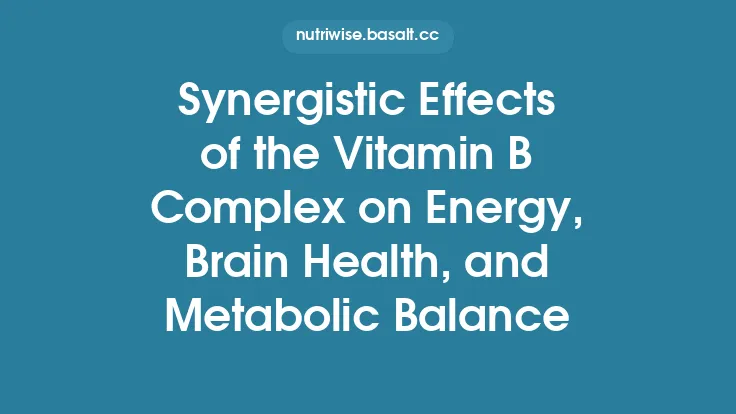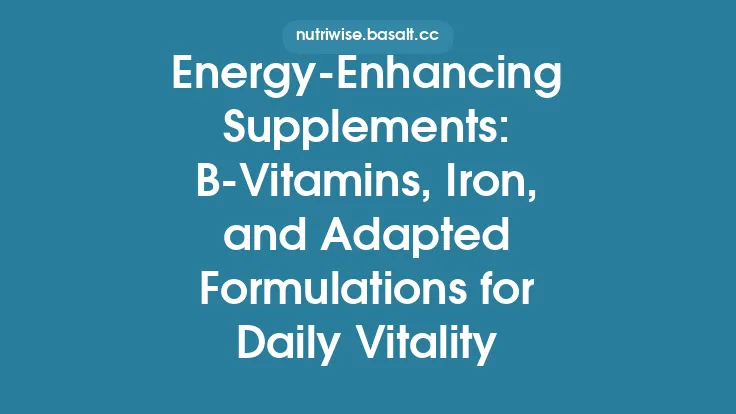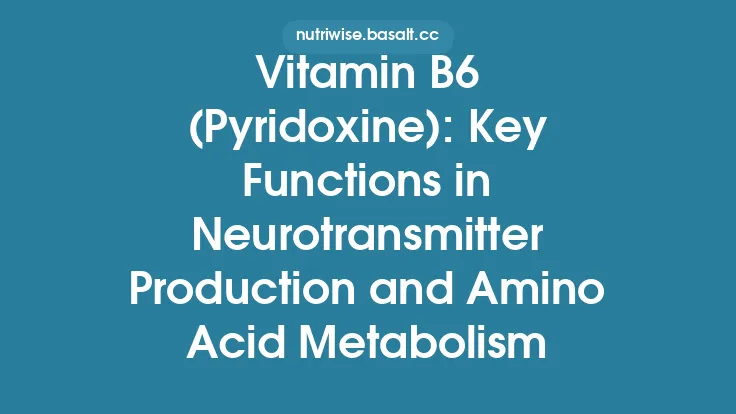The modern world constantly challenges our bodies with physical, mental, and emotional stressors. While a single nutrient can offer a modest benefit, the full spectrum of Bâvitaminsâcollectively known as the vitamin B complexâacts as an integrated network that underpins the bodyâs ability to adapt, recover, and thrive. By supporting energy production, neurotransmitter balance, hormonal regulation, and cellular protection, the B complex forms a biochemical foundation for stress resilience and overall vitality. Understanding how these waterâsoluble vitamins work together helps us appreciate why a balanced intakeâthrough diet or thoughtful supplementationâcan be a cornerstone of longâterm health.
The B Complex as a Metabolic Cohort
All eight Bâvitamins (B1, B2, B3, B5, B6, B7, B9, and B12) are essential cofactors in enzymatic reactions that convert macronutrients into usable cellular energy. Rather than acting in isolation, they operate in cascades:
- Coâenzyme formation â Several Bâvitamins are precursors to coâenzymes (e.g., NADâș/NADPâș from B3, FAD/FMN from B2, and CoA from B5) that shuttle electrons and facilitate redox reactions.
- Interâdependency â The synthesis of one coâenzyme often requires another Bâvitamin. For instance, the conversion of tryptophan to niacin (B3) depends on B6, while the regeneration of tetrahydrofolate (active B9) is linked to B12 status.
- Energy flux â By ensuring that glycolysis, the citric acid cycle, and oxidative phosphorylation run efficiently, the B complex sustains ATP levels, which are critical for every stress response, from muscle contraction to immune activation.
When any member of the complex is suboptimal, bottlenecks emerge, leading to reduced energy availability, accumulation of metabolic intermediates, and heightened perception of fatigue.
Neurochemical Balance and Mood Regulation
Stress resilience is intimately tied to the brainâs ability to synthesize and recycle neurotransmitters that modulate mood, cognition, and the autonomic nervous system. The B complex contributes at several key points:
- Synthesis of serotonin, dopamine, and norepinephrine â B6 serves as a coâfactor for aromatic Lâamino acid decarboxylase, while B9 and B12 are required for the methylation cycles that convert homocysteine to methionine, a precursor for Sâadenosylâmethionine (SAMe), a universal methyl donor in neurotransmitter synthesis.
- Regulation of the hypothalamicâpituitaryâadrenal (HPA) axis â Adequate Bâvitamin status supports the production of cortisolâbinding globulin and helps maintain the feedback inhibition that prevents chronic cortisol elevation.
- Neuroprotective antioxidant support â B2-derived flavin coâenzymes are integral to glutathione reductase, which recycles glutathione, the brainâs primary intracellular antioxidant. This protects neuronal membranes from oxidative stress generated during acute or prolonged psychological strain.
Collectively, these actions help maintain a balanced neurotransmitter milieu, reducing anxiety, irritability, and the âbrain fogâ often reported during periods of high stress.
Hormonal Harmony and Immune Competence
Beyond the nervous system, the B complex influences endocrine and immune pathways that are pivotal during stress:
- Adrenal health â B5 (pantothenic acid) is a component of coenzyme A, which is essential for the synthesis of steroid hormones, including cortisol and adrenal androgens. Adequate B5 ensures the adrenal glands can meet the increased demand for cortisol during acute stress without depleting reserves.
- Thyroid function â B2 and B3 are involved in the conversion of thyroxine (T4) to the more active triiodothyronine (T3), supporting basal metabolic rate and thermogenesisâprocesses that become dysregulated under chronic stress.
- Immune modulation â Bâvitamins support the proliferation and activity of lymphocytes, macrophages, and natural killer cells. For example, B6 is required for the synthesis of immunoglobulins, while B9 and B12 are crucial for DNA synthesis in rapidly dividing immune cells.
A wellâbalanced B complex therefore helps the body mount an effective immune response while preventing the immunosuppression that can accompany prolonged stress.
Antioxidant Defense and Cellular Repair
Stress, whether physical (exercise, injury) or psychological, generates reactive oxygen species (ROS) that can damage lipids, proteins, and DNA. The B complex bolsters the bodyâs antioxidant capacity through several mechanisms:
- Glutathione regeneration â As noted, B2-derived flavin coâenzymes are essential for glutathione reductase, while B6 assists in the synthesis of cysteine, a rateâlimiting substrate for glutathione production.
- NADâș/NADPâș pools â B3-derived nicotinamide adenine dinucleotide (NADâș) and its phosphorylated form (NADPâș) are central to the activity of enzymes such as superoxide dismutase and catalase, which neutralize ROS.
- DNA repair pathways â B9 and B12 facilitate methylation reactions that regulate gene expression and support the activity of enzymes involved in base excision repair, a primary mechanism for correcting oxidative DNA lesions.
By maintaining robust antioxidant systems, the B complex reduces cellular wear and tear, preserving tissue function and overall vitality.
Dietary Sources and Practical Intake Strategies
Because Bâvitamins are waterâsoluble, the body does not store them in large quantities, making regular consumption essential. A diverse diet typically supplies adequate amounts, but certain patterns and life stages increase demand:
| Food Group | Representative Bârich Foods | Key Bâvitamins Provided |
|---|---|---|
| Whole grains & cereals | Brown rice, oats, fortified wheat bran | B1, B2, B3, B6 |
| Legumes & nuts | Lentils, chickpeas, almonds, sunflower seeds | B1, B3, B5, B6, B9 |
| Animal products | Lean meats, poultry, fish, eggs, dairy | B2, B3, B5, B6, B12 |
| Leafy greens & cruciferous veg | Spinach, kale, broccoli | B2, B5, B6, B9 |
| Fermented foods | Yogurt, kefir, tempeh, miso | B2, B12 (especially in fermented soy) |
| Fruits | Avocado, bananas, citrus | B5, B6, B9 |
Supplementation considerations
- Balanced Bâcomplex formulas â These provide a proportionate mix of all eight vitamins, reducing the risk of inadvertently creating a relative deficiency (e.g., high B6 without sufficient B12).
- Targeted dosing â For individuals with increased needs (e.g., athletes, pregnant persons, older adults, or those on restrictive diets), higher doses may be warranted, but should be guided by a healthcare professional.
- Timing â Because Bâvitamins can have a mild energizing effect, many people prefer taking them with breakfast or early in the day. Splitting the dose (morning and early afternoon) can help maintain steady plasma levels.
Safety, Interactions, and Contraindications
- Upper intake limits â Most Bâvitamins have high tolerable upper intake levels (ULs) due to their water solubility, but excessive B6 (>100âŻmg/day) can cause peripheral neuropathy, and very high niacin (B3) may lead to flushing or liver strain.
- Medication interactions â Certain drugs (e.g., metformin, protonâpump inhibitors, and some anticonvulsants) can impair Bâvitamin absorption or metabolism, necessitating monitoring.
- Special populations â Individuals with malabsorption syndromes (celiac disease, inflammatory bowel disease), chronic alcoholism, or vegans (particularly for B12) are at higher risk of deficiency and may benefit from routine Bâcomplex supplementation.
Integrating the B Complex into a StressâResilience Lifestyle
While optimal Bâvitamin status is a powerful tool, it works best when combined with other evidenceâbased stressâmanagement practices:
- Regular physical activity â Exercise stimulates mitochondrial biogenesis, increasing the demand for Bâvitamins and reinforcing their benefits.
- Adequate sleep â Sleep supports the nocturnal repair processes that rely on Bâvitaminâdependent pathways.
- Mindâbody techniques â Meditation, deep breathing, and yoga can lower cortisol levels, reducing the overall burden on Bâvitaminâdependent adrenal pathways.
- Balanced macronutrients â Pairing Bârich foods with complex carbohydrates and healthy fats ensures a steady supply of glucose and fatty acids for energy production.
When these habits are aligned, the vitamin B complex acts as a biochemical âglue,â holding together the physiological systems that enable us to meet daily challenges with vigor and composure.
Bottom Line
The vitamin B complex is far more than a collection of isolated nutrients; it is an interlocking network that fuels cellular energy, stabilizes neurotransmitter and hormone production, fortifies antioxidant defenses, and sustains immune competence. By ensuring a comprehensive intakeâthrough a varied diet and, when appropriate, a balanced supplementâindividuals can bolster their innate capacity to cope with stress, maintain mental clarity, and enjoy sustained vitality throughout life.





